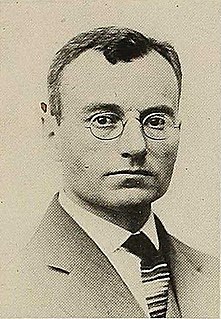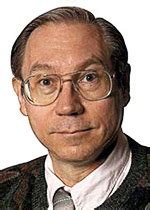A Quote by William Blackstone
So great moreover is the regard of the law for private property, that it will not authorize the least violation of it; no, not even for the general good of the whole community.
Related Quotes
Liberalism makes this mistake in regard to private property and Marxism makes it in regard to socialized property... The Marxist illusion is partly derived from a romantic conception of human nature... It assumes that the socialization of property will eliminate human egotism... The development of a managerial class in Russia, combing economic with political power, is an historic refutation of the Marxist theory.
This [anti-terrorism bill] is a violation of the First Amendment right to free speech and the Fourth Amendment protection of private property... Some of these provisions place more power in the hands of law enforcement than our Founding Fathers could have dreamt and severely compromises the civil liberties of law-abiding Americans. This bill, while crafted with good intentions, is rife with constitutional infringements I could not support.
All men, in the abstract, are just and good; what hinders them, in the particular, is, the momentary predominance of the finite and individual over the general truth. The condition of our incarnation in a private self, seems to be, a perpetual tendency to prefer the private law, to obey the private impulse, to the exclusion of the law of the universal being.
The mission of the law is not to oppress persons and plunder them of their property, even though the law may be acting in a philanthropic spirit. Its purpose is to protect persons and property.... If you exceed this proper limit -- if you attempt to make the law religious, fraternal, equalizing, philanthropic, industrial, or artistic -- you will then be lost in uncharted territory, in vagueness and uncertainty, in a forced utopia or, even worse, in a multitude of utopias, each striving to seize the law and impose it on you.
We hold that the ownership of private property is the right and privilege of every American citizen and is one of the foundation stones upon which this nation and its free enterprise system has been built and has prospered. We feel that private property rights and human rights are inseparable and indivisible. Only in those nations that guarantee the right of ownership of private property as basic and sacred under their law is there any recognition of human rights.
No one can deny that much of our modern advertising is essentially dishonest; and it can be maintained that to lie freely and all the time for private profit is not to abuse the right of free speech, whether it is a violation of the law or not. But again the practical question is, how much lying for private profit is to be permitted by law?
What I do know is, in little more than 30 years, we have gone from a nation where the “quiet enjoyment” of one’s private property was a sacred right, to a day when the so-called property “owner” faces a hovering hoard of taxmen and regulators threatening to lien, foreclose, and “go to auction” at the first sign of private defiance of their collective will ... a relationship between government and private property rights which my dictionary defines as “fascism.”
One ideological claim is that private property is theft, that the natural product of the existence of property is evil, and that private ownership therefore should not exist... What those who feel this way don't realize is that property is a notion that has to do with control - that property is a system for the disposal of power. The absence of property almost always means the concentration of power in the state.


































